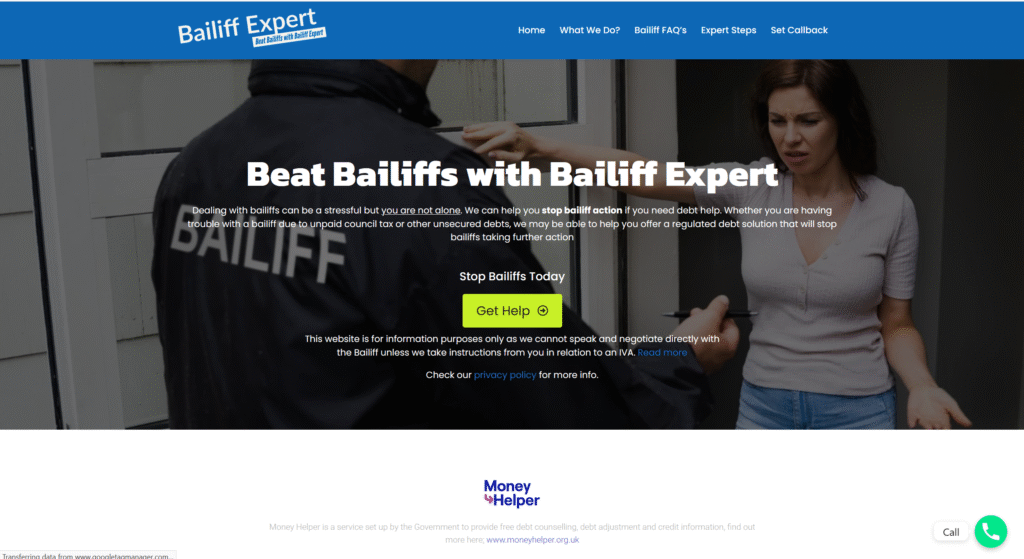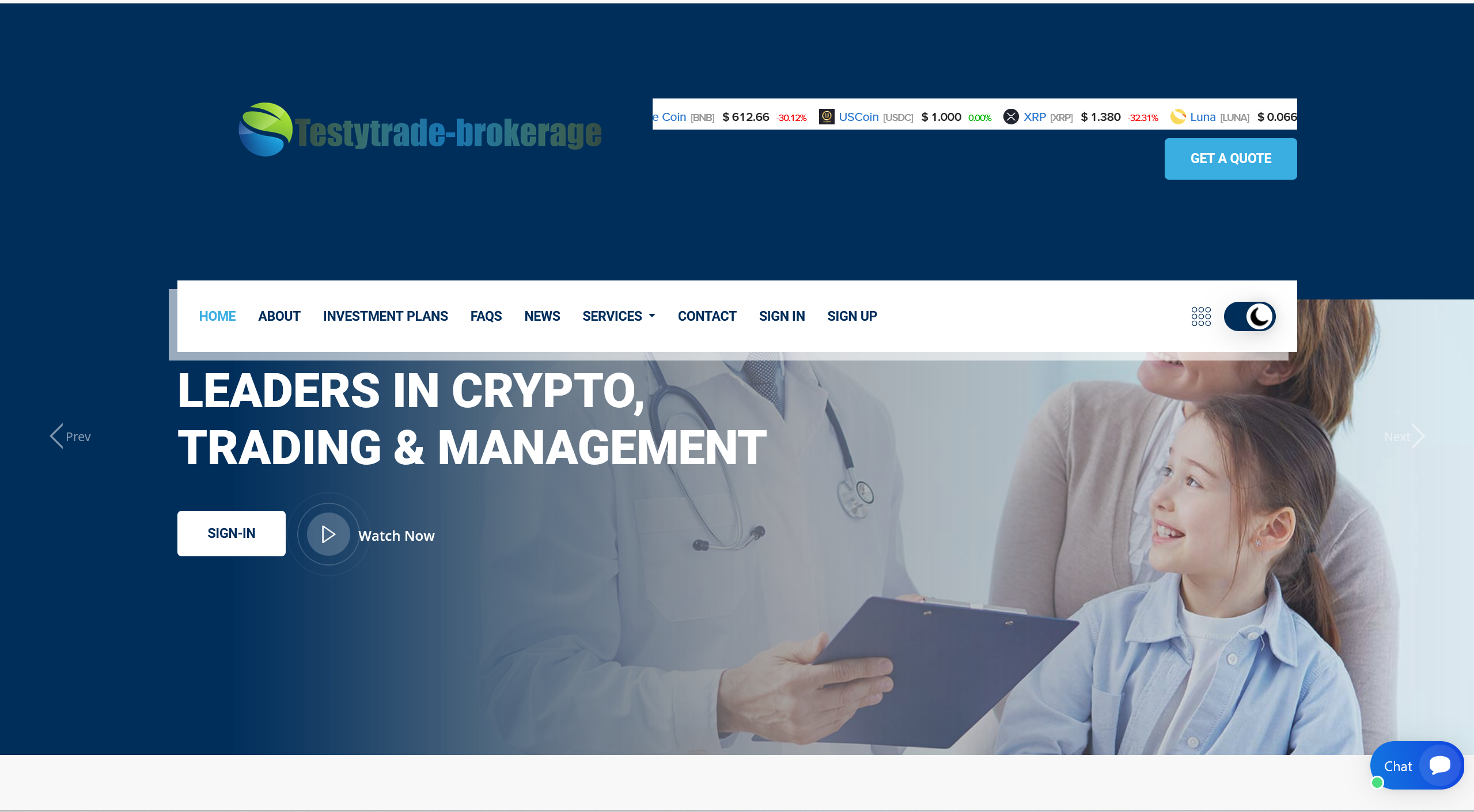1. Official Warning: Unauthorized Operation
One of the most concrete indicators that BailiffExpert may be hazardous is the Financial Conduct Authority (FCA) in the UK placing Bailiff Expert Ltd / bailiffexpert.com / bailiff-expert.co.uk on its Warning List. The FCA states that this firm “may be providing or promoting financial services or products without our permission.” That is a red flag that it operates outside authorized and regulated scope.
Because it is not authorized, the FCA warns that users who deal with the firm “won’t have access to the Financial Ombudsman Service” and will “not be protected by the Financial Services Compensation Scheme (FSCS)” if things go wrong.
That means if you hand over money, you may lose legal recourse and compensation rights under UK regulation.

2. Contradictory Claims & Marketing Language
The BailiffExpert website presents itself as a help service: “We can help you stop bailiff action … offer a regulated debt solution … arrange an affordable payment plan … prevent further bailiff action.”
However, the FCA’s position suggests that these claims are not backed by legitimate regulatory status. There’s a mismatch: a service claiming regulated assistance while being explicitly unlicensed. This contradiction is a classic tactic used by disreputable operators to build trust where none can be legitimately granted.
3. Contact Details & Identity Ambiguity
In its warning, the FCA points out that firms flagged as unauthorized may provide incorrect contact details—addresses, phone numbers, email addresses that may be fake, changed often, or belong to unrelated entities.
BailiffExpert’s website lists a callback phone number (0800 002 5880) and a contact form. But whether those contacts truly connect to a valid, accountable entity is unclear. A genuine service would have verifiable physical offices, registration numbers, and accountability.
4. No Verified User Reviews / Weak Reputation
When checking Trustpilot, BailiffExpert shows an average TrustScore of 3 out of 5 with only a single review. That weak footprint and lack of extensive user feedback is concerning.
Real, established services typically have numerous reviews (positive and negative), with verifiable user experiences. Few independent, critical reports may suggest the business is new, obscure, or avoiding public scrutiny.
5. High Risk of Overpromising & Under-delivering
Because BailiffExpert claims to “stop bailiffs,” “mediate with creditors,” and “write off unaffordable debts,” it raises expectations. But without regulatory backing or enforceable authority, those promises may be hollow.
Scams often lure users by promising exactly what they want to hear—legal protection, debt relief, immediate action—and underdeliver at the moment of truth (e.g. when funds are requested or services must be performed).
6. Pattern Matches Bailiff / Debt Scams
Bailiff / debt scams are well documented, and BailiffExpert exhibits several red flags known from government and consumer-protection warnings:
- Entities posing as bailiff or enforcement services that lack authority.
- Aggressive wording about immediate action unless payment is made.
- No prior legal notice or court process (scammers often skip formal steps)
- Use of fear, intimidation, false urgency.
The UK Government explicitly warns about scammers posing as bailiffs demanding transfers of money by email or phone, often without proper legal backing. Genuine bailiffs do not telephone asking for bank account transfers.
When the first or only contact is a demand for payment, that’s a strong indicator of fraud.
7. Severe Consequences if You Trust It
If you place trust in BailiffExpert:
- You might pay for services they cannot legally provide.
- They might request payment or personal data under false pretenses.
- You may lose money without any legal path to recover it.
- You could be lured into giving sensitive financial identity information.
Because it is unlicensed per FCA, and marketing contradicts that status, any transaction is done at your own risk with minimal protection.
Conclusion
BailiffExpert (bailiffexpert.com / bailiff-expert.co.uk) is a textbook case of a service walking the edge of legitimacy, leaning on fear and urgency to draw in vulnerable individuals. Its position on the FCA’s Warning List is not a minor notation — it’s a serious head’s up that the UK regulator views it as operating without proper authorization.
While the website markets itself as a solution to stop bailiff actions and mediate debts, those claims lack a foundation in regulatory credibility. The inconsistency between claiming regulated services and being plainly marked as unlicensed is too glaring to ignore. The promise of intervention when no legal status exists sets up expectations that likely cannot be met.
Contact details, if real, may serve only as fronts they may not connect to a regulated office or accountable staff. A company with legitimate operations would openly publish registration numbers, legal addresses, audited records, and transparent governance. The absence of such transparency is a red flag.
The paucity of independent, critical user reviews further amplifies concern. When a service is legitimate, many users speak up—good and bad. A single or negligible review count suggests either minimal usage or deliberate suppression of feedback. That weak presence in public forums and rating platforms is a warning sign.
Perhaps most alarming is how BailiffExpert mirrors known scams: invoking high-stakes threats, claiming immediate intervention, offering to write off debts, and promising to control or stop enforcement agents. These are emotionally potent claims used often by fraudsters. The UK government has long cautioned citizens about fake bailiff emails and enforcement threats demanding instant payments—genuine bailiffs follow formal legal procedures and do not demand transfers via cold calls.
If you are interacting with or have been directed to use BailiffExpert, here’s a practical safety checklist:
- Pause before paying anything — never pay upfront without verifying legal authority.
- Check the FCA register and other UK registers to see if the entity or its principals appear.
- Ask for proof of legitimacy — physical address, registration numbers, audited documents.
- Consult independent debt / legal advice before entrusting such services.
- Document all interactions — emails, phone numbers, names, screenshots.
- If you believe you were scammed, file reports with Action Fraud and relevant consumer protection agencies.
Vulnerability to debt, bailiff enforcement, and financial pressure can push many toward such services. But the very tools they use—urgency, fear, authority appeals—are often what give away the deception. In reality, a scam that promises you legal remedy without legal structure is just smoke and mirrors.
In our digital age, the ability to mask identity and legitimacy is stronger than ever. That makes personal due diligence more critical. Don’t let a polished-looking website or assertive message override common sense. Ask: Where is the proof of legal authorization? Where is independent validation? When those are missing, trust shouldn’t be granted.
Your caution is your protection. In the realm of debt and enforcement, legitimacy comes from law, not marketing. BailiffExpert fails to cross that threshold. Stay alert, ask hard questions, and never allow fear to force poor financial decisions.





